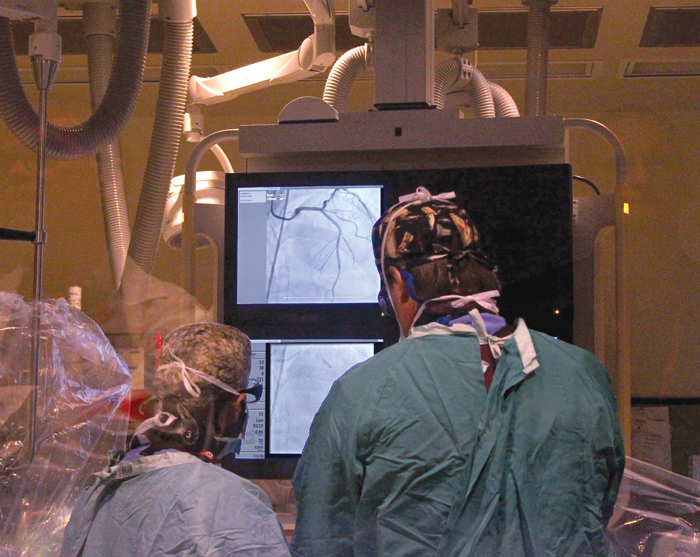
In July, the first patient in a landmark clinical trial received treatment at the University of Ottawa Heart Institute. The new ENACT-AMI (Enhanced Angiogenic Cell Therapy—Acute Myocardial Infarction) trial, led by the Ottawa Hospital Research Institute, is designed to test whether genetically enhancing a patient’s own stem cells can help the heart heal after a heart attack.
The adult heart possesses some capacity for repair: An estimated half of the heart’s cells die and get replaced over the course of a lifetime. But repairing the amount of sudden tissue damage caused by a heart attack is far beyond the capacity of the stem cells that produce new heart muscle, known as endothelial progenitor cells. Unfortunately, the result is that scar tissue develops, weakening the heart and potentially leading to future heart failure.
Previous small clinical trials have taken stem cells from patients, multiplied their numbers in the laboratory and then infused them back into the donors. These studies have shown disappointingly small improvements in heart function.
Some researchers, including ENACT-AMI Principal Investigator Dr. Duncan Stewart, have proposed that these disappointing results can be blamed in part on the age of the stem cells being used. “The stem cells that come from heart attack survivors who are 60 or 70 years old don’t have the same youth and potency as those from young healthy adults,” explained Dr. Stewart.
To give these older stem cells a boost, the ENACT-AMI trial collects patients’ stem cells and uses genetic engineering techniques to insert into their DNA a gene called endothelial nitric oxide synthase (eNOS). The researchers think that providing the stem cells with extra eNOS, an important signalling molecule the cells already possess, will help the stem cells work as hard as those from much younger patients.
“We’re hoping this novel way of enhancing the cells by giving them a gene will help them last longer and work better,” said Dr. Christopher Glover, an interventional cardiologist and lead for the Heart Institute’s ENACT-AMI team, which will enrol the majority of the trial’s patients.
“We’re hoping that if we can improve cardiac function, we’re going to help people live longer, live better and be able to stay away from the hospital.”
– Dr. Christopher Glover, Interventional Cardiologist, UOHI
Serving as the primary clinical location for ENACT-AMI is a natural extension of the Heart Institute’s own active regenerative medicine research program, which includes basic researchers and clinicians in specialties as diverse as tissue engineering, cardiac surgery, interventional cardiology and electrophysiology.
ENACT-AMI participants must have had a STEMI heart attack (in which the coronary artery is completely blocked)not less than five days but not more than 30 days previously for them to take part in the trial—this is the period in which the stem cells are thought to repair the heart tissue. Researchers randomly assign patients to one of three treatment groups: genetically altered stem cells, unaltered stem cells or placebo. Neither the patients nor the researchers know what treatment any one person is receiving. Heart pumping function of participants will then be compared across groups at six months.
“We’re hoping that if we can improve cardiac function, we’re going to help people live longer, live better and be able to stay away from the hospital,” concluded Dr. Glover.

